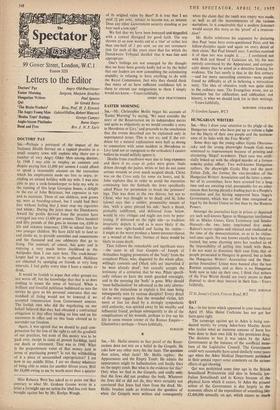EASTER MORNING
SIR,'—Mr. Christopher Hollis began his account of 'Easter Morning' by saying, 'We must consider the story of the Resurrection on its independent merits and quite as objectively as we would consider a story in Herodotus or Livy,' and proceeds to the conclusion that the events described can be explained only in supernatural terms. This is not so; and if the evi-
dence for a natural explanation were half as strong in connection with some incident in ,Herodotus or Livy (and not so repugnant to the orthodox) I cannot believe he would wilfully ignore it.
Deaths from crucifixion-were due to long exposure and thirst if no coup de grace were given. Nails driven through the palms, wrists or feet do not cause serious wounds or even much surgical shock. Christ was on the Cross only for some six hours, and St. John explains that in order to avoid the execution continuing into the Sabbath the Jews specifically asked Pilate for permission to break the prisoners' legs. This was done to the two thieves, but not to Christ, who was thought to be dead; and St. John (alone) says that a soldier, presumably unsure of this, 'with a spear pierced his side.' Such a thrust, probably indifferent, and delivered from below, would be very oblique and might not even be pene- trating. If delivered on the right side—as tradition invariably depicts it, and as is more likely if the soldier were right-handed and facing his victim— it might at the worst produce a hxmo-pneumo-thorax or a wound of the liver. Neither of these would be likely to cause death.
Then follows the remarkable and significant story —the same in all four Gospels—of Joseph of Arimathea begging possession of the 'body' from the compliant Pilate, who, disgusted by the whole affair, willingly consents and (Mark tells us) 'marvelled if he were already dead'; but casually accepts the testimony of a centurion that he was. Pilate specifi- cally refuses to have the tomb guarded overnight, and in the morning the 'body' is gone. Why should 'mass hallucination' be advanced as the only alterna- tive to the miraculous to explain .a live man being subsequently seen by various disciples? Every detail of the story suggests that the wounded victim, left more or less for dead by a strongly sympathetic civil authority, was spirited away by his wealthy and influential friend, perhaps subsequently to die of the complications of his wounds, perhaps to live out his life in some remote corner of the Roman Empire— Glastonbury perhaps.—Yours faithfully, SURGEON






























 Previous page
Previous page